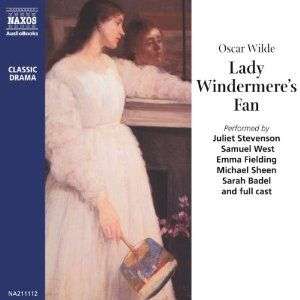Book Review – LADY WINDERMERE’S FAN by Oscar Wilde
 Lady Windermere’s Fan Synopsis:
Lady Windermere’s Fan Synopsis:
Oscar Wilde’s first play confronts the hypocrisy of public “morality” compared with genuine, private kindness. When it opened in 1892, Lady Windermere’s Fan was an instant success and now, more than a century later, it continues to be revived frequently. The reasons for its popularity are not difficult to identify: the play’s witty dialogue contains many of Wilde’s most quoted aphorisms, its stylish setting provides opportunities for elegant presentation, and its cast of memorable characters play out a story which is genuinely moving. This new audio production brings together a full cast worthy of Wilde’s creative genius. (Audible)
BOOK REVIEW
Each time I treat myself to a title from Oscar Wilde I am impressed by how well his humour still translates to modern readers, and in turn, reminded of how avante garde his writing was for its time. I loved listening to a dramatisation of The Importance of Being Earnest some time ago now, so was delighted to find a dramatisation of Lady Windermere’s Fan in my library’s catalogue.
I’d heard many of Wilde’s famous one-liners from this piece before such as,
“Scandal is gossip made tedious by morality.”
and
“What is a cynic? A man who knows the price of everything and the value of nothing.”
but it was such a delight to hear them in context, delivered with such fervour by this wonderful cast. Juliet Stevenson brings an appealing strength to the much maligned character Mrs Erlynne and Emma Fielding, intense emotion to her performance as Lady Windermere. Samuel West’s earnest portrayal of Lord Windermere was beautifully juxtaposed with the flair of Michael Sheen’s colourful Lord Darlington (listen an audio sample).
I cannot imagine a better way of consuming the witty, rapid fire dialogue featured in Lady Windermere’s Fan (other than perhaps watching the play performed live on stage). The comedic timing displayed by this cast was superb. The predominantly one-sided conversations between Duchess of Berwick (Sarah Badel) and her daughter Lady Agatha Carlisle regarding the handsome Australian businessman Mr Hopper (Benjamin Soames), left me literally laughing out loud.
But beneath the entertaining farce of the high society context there is a serious and moving story line within Lady Windermere’s Fan that makes this piece more than a trifle or passing fancy.
Oscar Wilde was clearly a man before his time. In highlighting the hypocrisy of high society within a vehicle that the perpetrators of that hypocrisy would find scandalous (and hence delectable) he seeded progressive thinking.
I’ll leave you with my favourite quote from Lady Windermere’s Fan by the very colourful Lord Darlington,
“We are all in the gutter, but some of us are looking at the stars.”
The next time you have just under 2 hours spare, treat yourself to this audiobook like I did. It is guaranteed to bring a smile to your face.
BOOK RATING: The Story 4.5 / 5 ; The Writing 5 / 5
Disclosure: If you click a link in this post we may earn a small commission to help offset our running costs.
BOOK DETAILS: Lady Windermere’s Fan by Oscar Wilde ( Audible | Booktopia | Book Depository | Kobo | Amazon | Scribd -Free 1 Month Trial )
Genre: Audio, Classic, Humour, Drama, Literature
About the Author, Oscar Wilde
Oscar Fingall O’Flahertie Wills Wilde was born in Dublin in 1854. He was educated at Trinity College, Dublin and Magdalen College, Oxford where, a disciple of Pater, he founded an aesthetic cult. In 1884 he married Constance Lloyd, and his two sons were born in 1885 and 1886. His novel, The Picture of Dorian Gray (1891), and social comedies Lady Windermere’s Fan (1892), A Woman of No Importance (1893), An Ideal Husband (1895), and The Importance of Being Earnest (1895), established his reputation. In 1895, following his libel action against the Marquess of Queesberry, Wilde was sentenced to two years’ imprisonment for homosexual conduct, as a result of which he wrote The Ballad of Reading Gaol (1898), and his confessional letter De Profundis (1905). On his release from prison in 1897 he lived in obscurity in Europe, and died in Paris in 1900.
